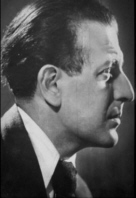Gustav Ucicky
| Gustav Ucicky | |
|---|---|

Gustav Ucicky (1930)
|
|
| Born |
6 July 1898 Vienna, Austria-Hungary |
| Died | 27 April 1961 (aged 62) Hamburg, West Germany |
| Occupation | Film director |
| Years active | 1916–1961 |
Gustav Ucicky (6 July 1898 – 27 April 1961) was an Austrian film director, screenwriter and cinematographer. He was one of the more successful directors in Austria and Germany from the 1930s through to the early 1960s. His work covered a wide variety of genres, but he most acclaimed for his work in romantic drama and drama films.
Born in Vienna, Ucicky is often stated to have been the illegitimate son of painter Gustav Klimt for whom his mother Maria Učicky from Prague worked and modelled, although this paternity is unconfirmed. He had begun an apprenticeship as a graphic designer, when he entered the film industry at the age of 17. One day in 1916, he and his friend Karl Hartl turned up at the Sascha-Film studios of Count Alexander Kolowrat looking for work and were hired. Ucicky was initially employed as a mere camera assistant, eventually becoming a camera operator and gained experience working in documentaries before shooting his first feature in 1919. Over the next five years, he worked on some of the studio's most acclaimed movies, including Sodom und Gomorrha (1922), and worked with some of the top directors of the period, including Michael Curtiz.
In 1927, Ucicky moved into directorship on a series of productions after the release of Die Pratermizzi and Café Elektric (starring Marlene Dietrich and Willi Forst) in 1927, when the death of the studio's founder Kolowrat and the subsequent bankruptcy of the company forced him to relocate his career to Germany. In 1929, he was hired by the Ufa Film Company in Berlin and was part of the first wave of directors there to embrace sound film. After directing Hokuspokus/The Temporary Widow in 1930, he quickly moved into the front rank of young directors, generating a string of popular, successful films, like Morgenrot. His 1933 drama Flüchtlinge was a major success in Germany, in addition to being well received in America, despite it being a propaganda film about a German official (Hans Albers) who helps to rescue a group of his countrymen from the brutality of the Soviet Union and return them to their homeland. Ucicky was one of the leading directors at Ufa throughout the mid- and late '30s, working with major stars, including Emil Jannings (in The Broken Jug, 1937).
...
Wikipedia
